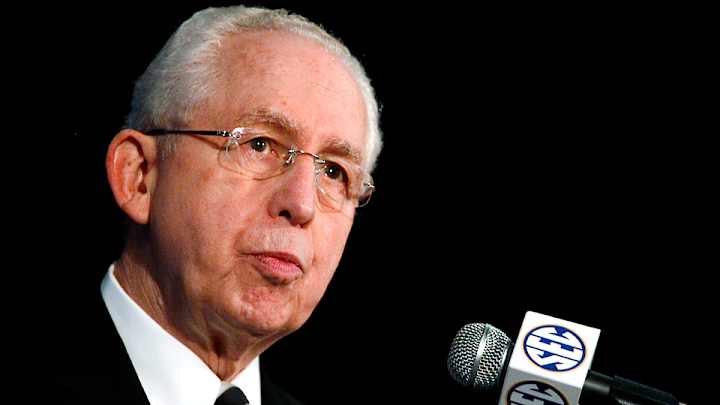SEC commissioner Mike Slive to retire after leading league to new heights

SEC commissioner Mike Slive will retire on July 31, 2015, the conference announced Tuesday, marking the end of one of the most successful tenures of any conference commissioner in recent memory. Slive is stepping down after a “recurrence of prostate cancer” that was diagnosed following a surgery in his back in August. The league has said that his “prognosis is good.”
Under Slive the SEC won seven of the last eight national championships, helped see the College Football Playoff come into being and launched a national network in August that is currently available in more than 90 million homes. He also made the league stronger in the wake of conference realignment, adding Missouri and Texas A&M in July 2012.
Slive first received treatment for prostate cancer in the 1990s.
“I have been blessed in more ways than I can count and I will have as much passion for this job on my last day as I did on my first,” Slive said in the conference’s official release. “I consider my health situation a temporary detour in a remarkable road that has allowed me to meet amazing people, experience incredible events and celebrate historic victories. I will relish my final year in the position and look forward to being the biggest fan of the SEC for many years to come.”
• STAPLES: What have we learned at season's midpoint?
The search for a successor will begin soon, according to the SEC, and it is assumed Slive will have great input into who the conference appoints. According to SI.com’s Pete Thamel, SEC chief operating officer Greg Sankey is the prime candidate to succeed Slive.
Many college football fans joke or claim media bias toward the SEC, but none of that would happen had Slive not turned the conference into such a national powerhouse over the course of his term as commissioner. The league saw an almost unprecedented reign of success in the BCS over the past decade, and Slive parlayed that success into the SEC Network, which at launch was more readily available than both the Big Ten Network and the Pac-12 Network.
"No league has ever transformed itself to the extent the SEC has under Slive," said Stewart Mandel, Fox Sports senior sports columnist and author of "The Thinking Fan's Guide to the College Football Playoff." "It was a scandal-ridden league with good football but modest national prestige. Today it's the gold standard on the field and in TV exposure."
At the end of May, the SEC announced that it would distribute a record $292.8 million in revenue between its member schools, up from a record distribution the year before. The league continues to grow and thrive, and it’s not unlikely that the SEC will see another record year in revenue when the numbers come out next year.
• RICKMAN: Mississippi State isn't perfect, but it's No. 1 in Power Rankings
For all that Slive did for the SEC, his most lasting impact may be felt in the landscape of college football as a whole. Slive was a vocal advocate for a playoff ever since an undefeated Auburn team was left out of the BCS national championship in 2004.
Slive was also one of the more active supporters of autonomy for the Power Five conferences and pushed for a stipend for college athletes.
“I’m going to work until I’m not working,” Slive told SI.com’s Andy Staples back at SEC media days this summer. “That’s sort of how I operate. I think I’ve made a contribution to the league, and it’s been good.”
